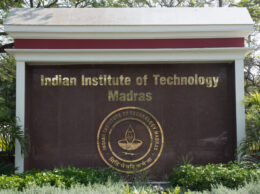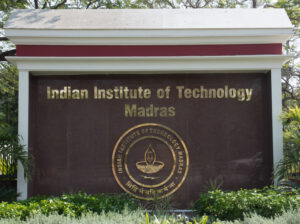CHENNAI : Dr. Subhas Sarkar, Hon’ble Minister of State for Education, Government of India, inaugurated a workshop on public policy development for Amrit Kaal at Indian Institute of Technology Madras (IIT Madras), conceived to develop policies for the nation.
The Hon’ble MoS also interacted with Prime Minister’s Research Fellows (PMRF) and inaugurated a ‘Capacity Building Workshop on Leadership Skills’ for Registrars of IITs, IISERs, and IISc, today (17th February 2023).
Interacting with the Prime Minister’s Research Fellows (PMRF) at the ‘Annual PMRF Symposium 2023’, Dr. Subhas Sarkar, said, “Research will have to be for the society and the country. The key objectives of research must first be the generation of profound and disruptive knowledge and second, the consumption of this knowledge for socio-economic good. We must focus on innovations and start-ups. Our Government has launched the Atal Mission to promote innovation and more tech incubators have been established in the last few years. The industry must contribute by providing timely guidance.”
Dr. Subhas Sarkar urged the PMRF Fellows to dream big for the benefit of the nation and work towards realizing the Hon’ble Prime Minister Shri Narendra Modi’ vision of ‘Jai Anusandhan.’
Dr. Subhas Sarkar added, “The Government is committed to providing an enabling environment to build a new India, which will take advantages of the opportunities of the present and future.”
The PMRF Scheme has been designed to attract India’s best and brightest to research. Fellowships are offered to select PhD students from PMRF granting institutions after a rigorous evaluation process. Their performance is continuously monitored by a team of national experts. Fellows whose performance was commended by the review panel are invited to make in-person presentations at the annual symposium.
Delivering an introduction to PMRF, Prof. Shanthi Pavan, Dean (Academic Research, IIT Madras, said, “The scheme attracts top notch students to research and is already showing excellent results, contributing towards Atmanirbhar Bharat. There has been a total of 2,650 admissions in 38 granting institutes so far. The PMRF has also been mandated to create a social impact. The PMRF Scholars have to spend an hour every week in a local college or a polytechnic and take classes at NPTEL/MOOCS. The Scholars have spent a total of 1,14,250 hours to improve the technical expertise in India.”
The Public Policy workshop was a curtain raiser on contemporary public policy issues pertaining to AI, circular economy, public health, e-governance, and social media. The focus areas of this workshop include alleviation of digital divide among different stakeholders, adoption of emergent technology like machine learning, etc. for ease of operation, utilization of new digital payment platforms, sustainable use of resources, data security/transparency/privacy and framing policies related to social media.
The inauguration of the first workshop in this series is being organized by a cluster of institutions, namely, IIT Madras, IIT Tirupati, NIT Calicut and NIT Puducherry, where IIT Madras is front-ending this cluster. Through these workshops, the participants would gain deep insights and awareness of the role of various factors such as IT, digitalization, cybersecurity, sovereignty, globalization, sustainability, political philosophy, and regulations on issues of national and global importance, and develop the ability to subsequently engage with policy issues of their interest in future.
Prof. V. Kamakoti, Director, IIT Madras, presented to Dr Subhas Sarkar an eco-friendly jacket made of recycled PET bottles by Ecoline, a firm run by IIT Madras Alumna Ms. Viji Shankar.
Addressing the Public Policy Workshop, Prof. V. Kamakoti, Director, IIT Madras, said, “This workshop is extremely important and we have brought together all possible stakeholders from civil servants and elected officials to lawyers and doctors to create a think tank. This will help in effective formulation of Public Policy, which are inter disciplinary in nature and impact the common people, in a quick manner. This will be a yearly event and the Institute hopes to form many think tanks in the future.”
Prof. M. Thenmozhi, Head, Department of Management Studies (DoMS), IIT Madras and Prof. R K Amit, DoMS, IIT Madras, also spoke on the occasion.
Delivering the keynote address at the Capacity Building Workshop for Registrars of IITs, IISERs, and IISc, Dr. Subhas Sarkar said, “Our Government is committed to reforming the education system in India and making it more inclusive and dynamic. The National Education Policy (NEP) 2020 envisaged an education system rooted in Indian Ethos to create a vibrant India and provide high quality education for all to make India a global knowledge superpower.”
Dr. Subhas Sarkar added, “As our Hon’ble Prime Minister Shri Narendra Modi has said, the NEP will ensure the seeds for starting a new era and give a new direction to 21st Century India. Higher education contributes significantly towards sustainable growth and economic development. Any policy depends on good implementation and that will be done by all of you (Registrars)… The Registrars have a pivotal role not only in day-to-day operations but in ensuring that the Institute is steadily progressing as per its mission and vision.”
Dr. Subhas Sarkar also visited the Sudha Gopalakrishnan Brain Centre and the newly-revamped Heritage Centre at the IIT Madras campus along with various start-ups and research centres at the IIT Madras Research Park.








